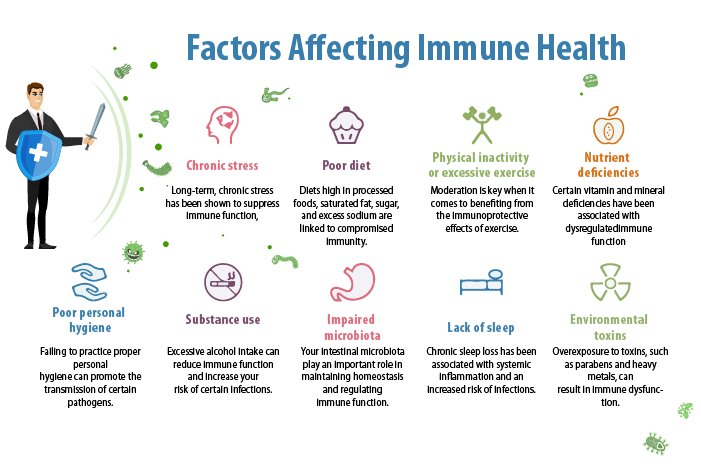Fight Weak Immune System with These Important Factors

The outbreak of Covid-19 in 2020 emphasised, more than ever, the need to build strong immunity. Populations worldwide have been forced to review and rethink their lifestyles, seeking different ways in which they can improve their immune system. We know that a robust immune system is essential for healthy living as it protects us from infections caused by viruses, bacteria, parasites, and other pathogens. Those with weak immunity are more prone to infections.
But,
- What does the immune system consist of?
- How does it work?
- What are the signs and symptoms of a weakened immune system?
- In what ways can you boost your immunity?
In this article, Helvetica Health Care (HHC) explains everything you need to know about the immune system by answering these questions and gives you some valuable tips on how you could improve your immunity.
HHC is a leader in the supply of products and services that improve lab efficiencies. We continue to expand our collection of new virus and bacteria strains and strive to provide labs worldwide with products in various formats designed to meet your research and product development needs.
What is the immune system?
The immune system is our body’s defence mechanism that fights and protects us from infections when exposed to pathogens. If you have a weakened immunity system, you are more susceptible to contracting bacterial or viral infections. This firewall-like system comprises white blood cells, antibodies, organs, and lymph nodes that work in unison to fight against germs.
The human body has two kinds of immunity: innate and adaptive.
Innate immunity comprises the primary shield from microbes that try to invade our bodies thanks to protective barriers such as:
- Our skin covers us and wards off multiple pathogens
- Our mucus that traps germs
- Stomach acid that destroys microbes
- Enzymes released in our sweat and tears that produce antibacterial compounds
- Immune system cells or white blood cells that tackle and stave off all foreign cells from entering the body
Adaptive or acquired immunity is a process that develops the ability to identify a pathogen. Several organs and cells, like the spleen, thymus, bone marrow, and lymph nodes, regulate this complex process. When a harm-causing microbe enters the body, these cells and organs produce multiple yet specific white blood cells through antibodies that counter and destroy the foreign microbe. The immune system now knows the alien microbe and adapts to protect our body the next time the microbe tries to enter more efficiently and quickly.
What are the signs of weak immunity?
There are many disorders which can compromise your immunity. Some are congenital (Immunodeficiency), while others may arise due from external factors such as:
- HIV
- Cancer and cancer treatments
- Viral hepatitis
- Malnutrition
- Certain medical treatments
The first signs of a weakened immune system are frequent susceptibility to contracting infections and diseases. An immunocompromised person is likely to fall ill often, and sometimes, the treatment may be relatively longer and harder, with a high frequency of the disease recurring. A person with low immunity may contract infections that an average person with stronger immunity may not be likely to get.
Skin infections, pneumonia, bronchitis, meningitis, etc., are some diseases that most people with weak immune systems often contract. They may also experience other illnesses like autoimmune disorders, inflammation of the internal organs, blood disorders or abnormalities, such as anaemia. Immunocompromised persons may also suffer from digestive issues, such as abdominal cramping, loss of appetite, diarrhoea, and growth and developmental delays, in infants and children.
Factors that can fight a weak immune system
Our immune system does a remarkable job of defending us against disease-causing pathogens. However, sometimes, it fails to do so, and a germ successfully enters the body.
As we age, our immune responses tend to become slower and reduced. Poor diet, unhealthy lifestyle, smoking, alcohol intake, lack of sleep, and stress lead to a weakened immune system. Here are some essential factors to incorporate into your lifestyle to strengthen your immunity.
A healthy diet
The body is the product of the food that we consume. Maintaining a wholesome and healthy diet can improve the immune system tremendously. Eating well means consuming fresh produce packed with fibrous foods containing zinc, beta-carotene, vitamins A, C, and E, and other nutrients you need for a healthy body. Eggs and fish are excellent sources of Vitamin D, which is a must for strong immunity. Balance your meats with plant-based foods, which lower your body fat percentage and strengthen your immune response. You can supplement your diet with medication only if recommended by your doctor.
Sleeping well
Studies prove that lack of sleep can negatively impact your immunity. Lack of sleep makes you vulnerable to viruses and germs. Insufficient sleep will also make your recovery time longer because your body is unable to produce antibodies or disease-fighting proteins (cytokines) that your immune system releases during sleep.
Exercise to maintain a healthy weight
Regular exercise and physical activity keep the mind and the body fit. Outdoor activities are a great way to get sun and boost your immune system. Exercise strengthens the body and releases endorphins that reduce stress levels. Persons with a weak immune system should be careful not to push themselves too hard, as this can weaken the immune system further. Drink plenty of water. Lymph, a clear fluid in your circulatory system that carries infection-fighting immune cells, is primarily made up of water. Dehydration can slow down the movement of lymph and impair the immune system.
Reduce your stress levels.
Scientific studies confirm that thoughts and emotions have physiological effects. If your stress and anxiety levels are high, your body’s germ-fighting capabilities diminish rapidly. Anxiety can weaken your immune response within 30 minutes of having anxious thoughts. Chronic stress is detrimental to the brain and compromises immune responses, making it tough to fight infections and illness. If stress affects your daily life, try relaxing activities like yoga, meditation, and massage.
Improve your lifestyle.
Frequent smoking, alcohol intake and a diet of processed foods are a recipe for disaster even in the case of a healthy person. If you are a meat lover, try opting for lean meats like seafood, chicken, etc. Smoking causes breathing problems, which means coughing up coloured mucus called phlegm, increasing your chances of developing lung infections. Alcohol intake impairs the function of immune cells in the lungs and kills the healthy gut bacteria which are instrumental in reducing the risk of infections.
The medical industry is constantly striving to find treatments and cures for diseases by evaluating immune disorders, and so is HHC. We have a wide range of INACTIVATED and LIVE ORGANISMS available in several formats, including CELL EXTRACT, PURIFIED VIRUSES, CELL CULTURES, INACTIVATED CULTURE FLUIDS and DIRECT PELLETED VIRUS.
VIRAL LYSATES products are purified by sucrose gradient centrifugation before inactivation. Our collection of bacterial strains is available as PURIFIED DNA (or NATtrol). Most bacteria are clinical isolates, and the identity of the stock culture is confirmed by 16S ribosomal gene sequencing.
Whatever your research and product development needs, HHC promises to provide you with the most advanced range of products and services to meet your specific requirements.
Want to know how we can help you? Contact us now. Our marketing team will give you all the information you need on our products and services.
